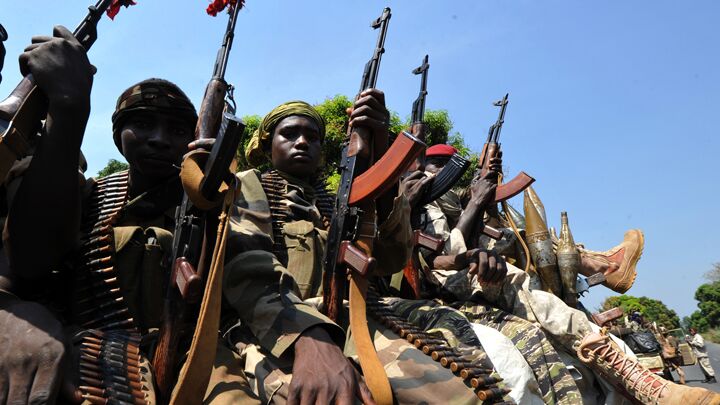
Chad Withdraws Troops From Crisis-Torn Central African Republic
Chad announced April 3 that it would pull out its 850 peacekeeping troops from the Central African Republic. The withdrawal, which began the following day, will slash almost 15 percent of the African Union’s peacekeeping mission in car.
In a statement from its Foreign Affairs Ministry, Chad explained that the withdrawal was essentially a response to criticism from aid agencies and foreign diplomats. “Despite the sacrifices we have made,” the statement said, “Chad and Chadians have been targeted in a gratuitous and malicious campaign that blamed them for all the suffering in car.”
Chad peacekeepers are predominantly Muslim, and they have been accused of siding with Muslims and Muslim rebels in the Central African Republic. The most contentious in a series of incidents of Chadian soldiers against Christians was on March 29, when the soldiers opened fire in a predominantly Christian marketplace in the capital Bangui. At least 30 civilians were killed and 300 more were seriously wounded. According to an April 4 report from the UN human rights department, the victims included children, pregnant women, handicapped people and the elderly.
Chad claims its soldiers only acted out of self-defense after they were attacked by Christian militia.
Once upon a time, car was ruled by a ruthlessly murderous regime of Muslims. It persecuted Christians in a spree of looting, rape and mass executions. Then the tables were turned by a barbaric resistance group curiously called anti-balaka, which name means “anti-machete.” The name has absolutely no bearing on its violent antics: The anti-balaka has used whatever implements and execution methods it could in its revenge attacks. It has flogged, knifed, stoned and burned people with impunity.
Human Rights Watch’s emergencies director Peter Bouckaert witnessed a number of lynchings in car. On January 29, he observed French peacekeepers at Bangui airport turning a blind eye to the execution of Muslims. The French have been accused of being too sympathetic to car Christians.
It is against this background that Chad’s Muslim soldiers were perceived to be sympathetic to car’s persecuted Muslims. Most car Christians welcome the withdrawal of Chadian peacekeepers from their country. Some Muslims are terrified because the withdrawal reduces the restraining force against the murderous anti-balaka Christian militia.
It all comes at a time when the EU is planning to send 800 troops of its own to the Central African Republic by the end of May, and after the April 10th adoption of a UN resolution to send 10,000 soldiers and almost 2,000 police officers to help stabilize the Central African Republic (see video below).
https://www.youtube.com/watch?v=CDLMjloLSwA&feature=youtu.be
French Ambassador to the UN Gerard Araud announced a UN resolution to send troops to car at a press conference in New York on April 10.
It also comes amidst the anniversary commemorations of Rwanda’s genocide of 1994. UN Secretary General Ban Ki-moon warned: “The international community failed the people of Rwanda 20 years ago. And we are at risk of not doing enough for the people of the car today.”
The Chad-car crisis has the markings of a religious war. It shows us that “holy” war on a national scale isn’t something that’s permanently confined to medieval history. Human nature has never changed. The lessons from the religious wars of old have not been learned, just as the international community has not learned the lessons from Rwanda’s genocide, as Ban Ki-moon acknowledged.
Based on current trends, full-scale religious war involving more players and a wider geography than that in the Chad-car crisis, is inevitable. For example, the Catholic Church has historically imbedded itself deeply in politics, especially Middle-Eastern politics. That trend remains discernible to this day. Islamists, on the other hand, have always unabashedly publicized their desire for forced conversion, with death as the only other option.
In his book Politics Among Nations, Hans J. Morgenthau observed: “The wars of religion have shown that the attempt to impose one’s own religion as the only true one upon the rest of the world is as futile as it is costly.” We explained more about this in our article “Return of the Religious War.”
Bible prophecy reveals that the next full-scale religious war will, thankfully, be the last crusade. God will then bring us permanent peace and security—as He has always desired for mankind to enjoy.
